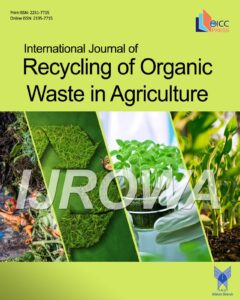Organic waste composting and sustainability in low‑income communities in Palestine: lessons from a pilot project in the village of Al Jalameh, Jenin
Authors
Abstract
Purpose A pilot composting project was initiated as part of a 200 tons/day solid waste recycling plant with active involvement of several local stakeholders. The project aimed at introducing compost production and use in the village of Al Jalameh, Palestine. This paper describes the successes and lessons from the pilot project.
Methods Based on the data collected on the population, waste production and economic activities, the best production methodology and composting units were designed and piloted. The compost was produced from animal manure, farm waste and organic fraction of domestic solid waste. Approaches to increase profit and sustain the initiative was implemented.
Results The facility managed by Al Jalameh Agricultural Cooperative Society, recycles 60% organic fraction of domestic waste reducing the quantity of waste to the landfill. An estimated 1425 m3 /year of compost are required for local agriculture while 800 tons/year is produced. With most of their compost coming from Israeli sources, the composting facility is at a competitive advantage. To increase the profit, around 28,125 kg of waste plastic sheets from greenhouses are collected for recycling each year generating a stable income of 5625.00 JOD/year.
Conclusions The compost produced in the village is purchased by the local farmers increasing access to compost at competitive price. Farmers are economically encouraged by compost production that could solve the organic waste management issue and at the same time guarantee a sort of “self-production” of fertilizer useful for local agriculture. This initiative could be extended to other villages in Jenin and other developing countries where agriculture is their major occupation.




